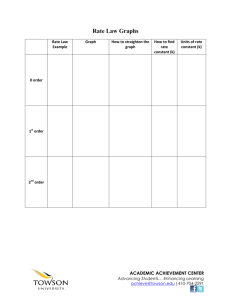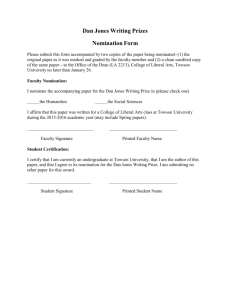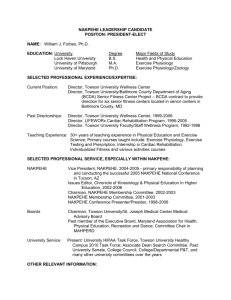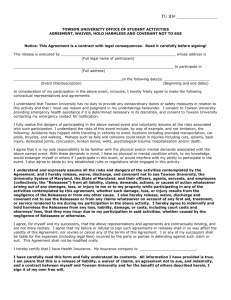Objective 1A Artifact
advertisement
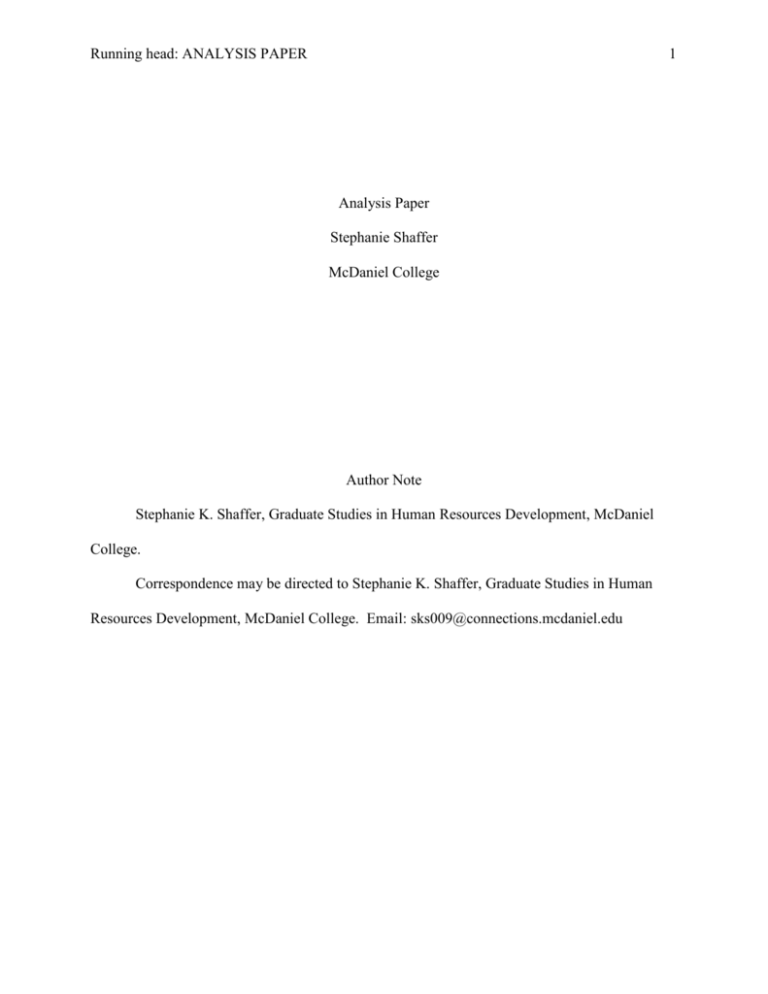
Running head: ANALYSIS PAPER 1 Analysis Paper Stephanie Shaffer McDaniel College Author Note Stephanie K. Shaffer, Graduate Studies in Human Resources Development, McDaniel College. Correspondence may be directed to Stephanie K. Shaffer, Graduate Studies in Human Resources Development, McDaniel College. Email: sks009@connections.mcdaniel.edu ANALYSIS PAPER 2 Analysis Paper This analysis of my career has helped me to reflect on my upbringing, the decisions I have made, and to prepare for the future decisions I will make. The Social Learning Theory proved to be the most relevant theory to best describe my career experiences thus far. As my career progresses, the Relational Perspective has the potential to play more of a role in my career decision making. My Career History As I was approaching the end of high school, I was planning to pursue my long-time vision of becoming a teacher, specifically a special education teacher. After interning in the special education department at a local elementary school, I decided to change my path to business. I began my college career at Drexel University in the business school. After one and a half years, I transferred to Towson University where I finished my bachelor’s degree in business with a concentration in human resources (HR) because my family was experiencing financial problems. This decision was a very difficult one for me to make, but I would not have been afforded my career with G2 or the marriage to my husband if I had not transferred. As I was preparing for college graduation, I did not have a firm job lined up. I did lots of searching online, but did not have a job offer in my field. As a result, I had decided to join a business my cousin had become involved in, selling jewelry as a consultant. I was very concerned about my ability to pay my bills after graduation, so I planned to sell jewelry as a backup plan until I could find a fitting human resources job. One day in the spring prior to graduation, I was sitting in my Compensation and Benefits course at Towson. My professor showed the class an email she received from a prior HR student that contained a job description for a HR administrator position at a small, Columbia based IT company. I applied for the job ANALYSIS PAPER 3 because the description seemed interesting and I had no other opportunities at the time. A week later I interviewed with the company and was hired to start after graduation. I was nervous because I had no true HR experience except for administrative experience in an HR department while in college. When I started at G2, my primary responsibilities included event planning, monthly employee outreach, executive assistance to the CEO, and benefits administration even though I had no benefits knowledge at all. I was frustrated that I lacked the benefits knowledge I needed to be successful in my role. Quickly, I developed a rapport with G2’s benefits broker and she taught me the basics. My first boss at G2 was the Director of People Services who oversaw me and the recruiter who had reached out to my professor at Towson. My boss at the time had no HR experience and minimal HR knowledge outside of recruiting. However, he was one of the pioneers of the G2 culture who I learned a lot from over the years. After 3 years of working for G2, I was promoted to HR manager and my new manager was the Chief Operating Officer (COO). This transition was more fitting since I had previously worked closely with the COO on most HR matters. I have learned a great deal working for G2 over the last four years. I have been afforded the opportunity to grow, with autonomy, and evolve my position into something greater each day that I go to work. As a result, I decided to continue my education by enrolling in McDaniel’s HRD program. Acquiring my master’s degree will enable me to pursue my dream of being a consultant and professor in the next few years. Today at G2, my responsibilities are mainly the following: legal compliance and employment advisement, benefits strategy and administration, payroll supervision, performance management, and the leader of process improvement for the corporate operations. ANALYSIS PAPER 4 Social Learning Theory When reflecting on the decisions that I have made to lead me to my career today, I most similarly relate to the Social Learning Theory. At the decision points, or critical incidents, I made most of my decisions based on my learning experiences. Specifically, my associative learning experiences have been critical in paving the way for my career. Other elements of the Social Learning Theory that help to further explain my career history are my structured educational setting, my self observation generalizations, my task approach skills, my behavioral strategies, and my happenstance event. Structured Educational Setting No one was a large influence on the college or degree choice that I made. This may have been a result of me being the first one in my family to pursue a college degree. My parents only wanted me to have a plan for how I would be successful. However, success was not defined or prescribed for me. I simply wanted better for myself than I had experienced growing up. My educational choices were later influenced and impacted when I was a sophomore at Drexel. My family was experiencing financial problems and could no longer help me with the cost of tuition. At that time, I decided to move back home and commute to Towson to finish my degree. I knew that I could complete my degree, with minimal debt, and still be successful. Learning Experiences Krumboltz (2013) describes two types of learning experiences; instrumental and associative. In making my career decisions, I did not have a lot of instrumental learning experiences. One of the instrumental learning experiences I had was my success in Towson University’s human resources program. I was successful in completing each of the courses in the program. This learning experience reinforced that I had chosen a good career path for myself. ANALYSIS PAPER 5 While at G2, I have developed HR skills that have been significant in helping me to achieve major accomplishments. Since I do not have a supervisor or colleague with formal HR experience at G2, I have done most of the research and implementation of programs by myself. Also, my learning experiences at G2 have helped to encourage me to further pursue my education. The HRD program at McDaniel has most significantly helped me to sharpen my time management skills and to view HR through a different lens; I’ve been able to add development skills to my HR management skills I acquired at Towson and on the job. On the other hand, I have had several associative learning experiences. I learned from the special education teachers at the elementary school that teaching special education had become very exhausting because of the influx of diagnoses in school aged children. Another associative learning experience I observed was the low income stereotype for school teachers. This stereotype seemed insignificant until my father experienced an overabundance of financial problems that dramatically impacted our family. After that experience, I was determined to be independent and financially stable. The restricted earning potential of teachers, in addition to the frustrations of the teachers at the elementary school had changed my perspective on becoming a teacher. Additionally, when I was at Towson, I had numerous adjunct professors who were successful HR professionals during the day and taught classes at night. When I made that observation, I realized I could still achieve my teaching dream by becoming a professor one day. While at G2, I have learned that taking risks and being committed to learning from others will pay off. I have colleagues that are not as committed to the organization as myself or others. Those of us that are committed to pitching in on tough projects, offering a helping hand to a teammate, and being open minded seem to progress further in the organization than others. ANALYSIS PAPER 6 Self Observation Generalizations Out of the three generalizations, abilities, interests, and values, the values have been most significant for me. I have always wanted a career that would allow me to help others. I planned to chase an education career, but later decided on the HR track. My career in HR has allowed me to help others in ways that I never thought I would be able to in corporate America. In a recent study, researchers found that “women may be more socialized to go into careers related to the work values of working with people and contributions to society,” (Duffy & Sedlacek, 2007, p. 363). Since I was a young girl, my overarching goal was to help people. I value community service and lending a helping hand. My career in human resources has allowed me to be fulfilled in that. Once I had experienced the family financial struggles in college, I developed a core value of stability. To me, stability is invaluable. Having the ability to live comfortably is a strong value of mine. In a study on Gender and Ethnic Differences in Career Goal Attainment, “women based career goals on intrinsic interest and prestige of the occupation” and cited “personal finances” as a barrier to achieving the goal (Alexander, Perrone, & Sedlacek, 2001, p. 50). The existence of the glass ceiling, combined with my personal experiences, definitely connects my values to this study. Three values that I have matured while at G2 are for proficient organization, communication, and clarity. In the fast paced environment I work in, while attending graduate school, I have developed an appreciation for those three skills. I value my ability to be organized, communicate effectively, and drive to clarity. Additionally, I value those in others. Our team has been more effective since we have employed some of those values as the core of the team. Without them, I, nor my team, would be as successful. ANALYSIS PAPER 7 Task Approach Skills Out of the five task approach skills, the two that have been most apparent in my career thus far are goal setting and generation of alternatives. From the time I was in college, I was determined to graduate in four years despite my transfer. In my daily work life, I set goals for myself on tasks that need to be completed and milestones I need to reach by certain deadlines. This goal setting has helped me to progress and make a meaningful impact at G2. For the generation of alternatives, I seem to develop several methods to complete a task at work. In addition, I am skilled at predicting overcoming obstacles before they derail a project. This skill will continue to help in my career development. Behavioral Strategies Two of the most noteworthy behavioral strategies that have influenced my career development thus far are reinforcement and role models. Through college and my years with G2, my family has been very supportive and helped to reinforce that I am doing a good job. Additionally, the executive team at G2 has been very vocal with their appreciation for the work I have done for the organization. They thank me formally and informally when I have achieved a goal or when I meet a major milestone. Further, they have recognized me in my performance reviews, my promotion, and resulting salary adjustments. Role models who have helped to guide and mentor me along the way have included my mom, both of my supervisors at G2, and several colleagues. My mom taught me that even when times are tough, you can overcome challenges by doing what is right and being committed to the future. When I reported to the Director of People Services at G2, he helped me to better understand effective communication. He is the most compassionate person I know. He taught me how to better relate with employees, be more empathetic, and play an effective role in ANALYSIS PAPER 8 employee relations. My current boss, the COO at G2, has been a role model because he has been very successful in his role. He has shown me that seeing a task through completion and evaluating the lessons learned can help you grow as a professional. While working for him, I have had the opportunity to learn tough lessons without penalty. He encourages me to learn from all lessons and continue to invest in myself. G2’s insurance broker has certainly become a role model for me. She is a successful business owner who is driven, humble, and fearless. She encouraged me to pursue the HRD program because she believes I can be much more as I continue to develop. She has taught me that there is no mountain too big to climb and there is a place in corporate American for successful women. Happenstance It was a moment of chance when my professor at Towson posted the job opening for the HR position at G2. I was able to interview and acquire the job all because of that unplanned event. Without that, I would not have had a HR job upon graduation. Unlike how the theory describes, I was not adequately prepared for happenstance. I had not been afforded the opportunity to increase my chances of happenstance. My experience was pure luck. However, out of the happenstance skills described in the text, I naturally demonstrate persistence, flexibility, and risk taking. The two skills that I am not as sharp on are curiosity and optimism. I would like to be coached so I can further develop those skills to help me in the future. Limitations and Recommendations One limitation to the study on the Social Learning Theory involves the belief that women who “selected nontraditional careers were likely to have been influenced by female role models,” (Sharf, 2013, p. 372). While that may be true, the theorists’ study of women does not include those women who choose a traditional career, or those women who have male role models. The ANALYSIS PAPER 9 theory could be enhanced if it discussed the influences on women who choose traditional careers and on women who have male role models. For me, this additional information in the theory would help me to better relate since the career I have chosen is often considered a traditional career for women and I have been influenced by both male and female role models. Another limitation to the study is the lack of research on negative role models. The theorists describe the importance of positive role models, but they do not discuss how negative role models could impact one’s choices. I would consider my father a negative role model; an individual who I do not aspire to be like. While I did have associative learning experiences that link to him, he is not the type of person I want to be. The theory could be enhanced if it discussed the significance of both the positive and negative role models in your decision making. I believe that the negative role model in my life has played a big part in the person I have become and hope to be. ANALYSIS PAPER 10 References Alexander, C., Perrone, K., & Sedlacek, W. (2001). Gender and ethnic differences in career goal attainment. The Career Development Quarterly, 50, 168-178. Duffy, R., & Sedlacek, W. (2007). The work values of first-year college students: exploring group differences. The Career Development Quarterly, 55, 359-364. Sharf, R. (2013). Applying career development theory to counseling. (6th ed.). Belmont, CA: Brooks/Cole, Cengage Learning.
